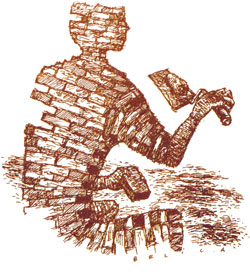 Prime Minister Koirala recently announced that he was in touch with, and ready to talk to, the Janatantrik Tarai Mukti Morcha (JTMM). The JTMM is a radical splinter of the Maoists, and is demanding an independent madhes. The JTMM has itself split into two groups-one led by Jay Krishna Goit and the other by Jwala Singh.
Prime Minister Koirala recently announced that he was in touch with, and ready to talk to, the Janatantrik Tarai Mukti Morcha (JTMM). The JTMM is a radical splinter of the Maoists, and is demanding an independent madhes. The JTMM has itself split into two groups-one led by Jay Krishna Goit and the other by Jwala Singh.
Whatever differences between the two, their aim and tactics are similar: both groups have led an anti-pahadi campaign in several eastern and central tarai districts, sowing terror and mayhem.
Koirala's offer of dialogue looks perfectly fine on the surface. How best to nip a brewing crisis in the bud than by calling for dialogue, right? But consider why this 'Nobel Peace Prize-worthy' leader doesn't issue a similar call to the moderate madhesis pining to talk to him and other senior leaders of the SPA government?
Maybe they have not noticed, but madhesi civil society leaders have still not received that call from Baluwatar so they can brief the prime minister on tarai issues. Yet the prime minister makes a conciliatory gesture to the JTMM. What message does this send?
To me, it seems pretty straightforward: no talking to you folks unless you pick up arms, sow mayhem, and call for secession, a la the JTMM.
If this is what our leaders want, it may not be too long before they get it, unfortunately. What we witnessed in Nepalganj last week was not merely a law and order issue. Neither can it be dismissed as instigated by 'regressive elements' or 'religious fundamentalists', though their possible role cannot be ruled out.
Nepalganj was, in essence, a clash of cultures and identities that has long been in the making. No matter how much religious or royalist colour you bestow on it, the underlying fact is that the violence was rooted in madhesi grievances and pahadi fears of subjugation.
It is tragic that Nepal's politicians, media, and civil society have all failed to draw the proper conclusions from the riots. The probe commission, peace marches, and calls for communal harmony will have little effect until the real issues are dealt with.
Pahadi leaders may be completely ignorant of madhes dynamics, but we don't see madhesi society trying to broaden its vision either. They are content to play the politics of victimhood, and prone to exhibiting the same knee-jerk reaction they accuse pahadis of.
Just last week, a pahadi bus helper was killed by JTMM radicals in Saptari for violating their transport strike. And yet, no madhesi group or intellectual specifically condemned it. There has been no sustained criticism of the anti-pahadi campaign by the JTMM in Siraha and Saptari, though it has been going on for months. The madhesi blogosphere today is full of anti-pahadi venom, and still there is no attempt to douse the flames.
No doubt, the discrimination against madhesis is genuine and pahadis would do well to address it now, before it's too late. But madhesis need to realise that they too must change their mindset and view criminality for what it is. Remaining silent in the face of anti-pahadi crimes perpetrated in the name of madhesi liberation reinforces the worst stereotypes and fears. And it does their cause little good because, in the end, if positive change is to come in this country, it can only be achieved when the majority moderates on both sides reach out and forge a common cause.
So let's hear madhesis denouncing anti-pahadi violence, and pahadis denouncing anti-madhesi prejudice. And Mr Prime Minister, before you make that call to the JTMM, how about talking to the moderates?



